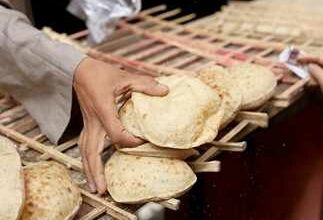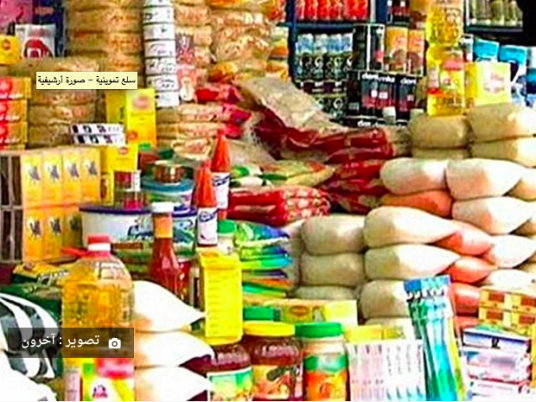Bread shortages are not new to Egypt, with the most acute crisis of the not-so-distant past occurring in 2008. Since then, shortages of the vital food supply have been recurring, and, at times, the army has been deployed to deliver the gap in supply.
In January 1977, under President Anwar Sadat, thousands of Egyptians took to the streets to protest the lifting of subsidies on vital commodities: oil, sugar and bread. The bloody protests left dozens dead and hundreds injured before the army was deployed and the subsidies were reinstated.
Fast forward to 2013 — President Mohamed Morsy is in power, and the Muslim Brotherhood’s Freedom and Justice Party dominates the political scene. Anger is vociferously leveled at the government for an array of political and economic reasons, most recently by bread bakers protesting the lifting of flour subsidies and a new subsidization system for bread production.
Subsidized bread is priced at 5 piasters, and is a staple food item for the country’s lower- and middle-class citizens. At times of crisis, this segment, which represents 80 percent of the population, suffers endless queues and fatal fights over bread.
Often, the government has blamed the supply shortages on black market bread sales, as well as the smuggling of flour and wheat, blaming bakery owners and accusing them of profiteering.
In what the ministry is selling as a bid to curb black market sales and ensure that subsidies reach target beneficiaries, a new policy has been created, whereby subsidies on key ingredients have been lifted, thus removing incentives for bakers to trade them on the black market. Private bakeries are being asked to sign on to the new contracts.
But it has been a hard sell. On 19 March, hundreds of bakery owners stormed the Supply and Internal Trade Ministry in downtown Cairo, protesting the new policy, as well as the rise in prices of gasoline, diesel and flour. Their most significant complaint is the raising of the cost of production of one sack of flour from LE80 to LE120.
They say the government, the sole supplier of wheat and other ingredients used in bread making, is looking to lay the burden of lifting subsidies on bakers, as well as failing to consider the actual production cost.
Weighing different considerations, each side regards the other with suspicion.
From the government’s viewpoint, private bakeries produce a quota of bread and sell it at the government-specified price, while the rest is sold for more. However, sometimes the subsidized wheat and flour provided by the ministry is sold on the black market for a considerable profit, leading to shortages on the market.
Bakery owners, on the other hand, say the government is essentially shifting the burden of producing bread onto them while failing to compensate them for the real cost of production and energy consumed.
They say the new policy will tighten the government’s grip on the bread industry through its continued monopoly over purchasing wheat, both through imports and from local farmers.
They also fear the FJP will exploit the new policy for electoral gains, namely after the appointment of Bassem Ouda, a party leader, as the supply and internal trade minister in January.
The debate between Ouda and bakery owners has been ongoing since the government began implementing the new subsidy system in February. The government says the system will save LE11 billion annually by making it more difficult for whole ingredients such as wheat to be sold on the black market.
Bakery owners, however, say the government is seeking to control the strategic product to continue hegemonizing a wider base of Egyptians.
When threatening a strike to protest the new subsidization system, Ouda responded to bakery owners by warning that all those “reckless” enough to respond to calls for civil disobedience would be shut down.
“And I will sue all bakers objecting to the new policy for baking bread,” he said.
Conflicting statements have come out from both sides regarding the number of private bakeries implementing the new policy.
Official statements say 17 of the 27 governorates have begun implementing the new policy, meaning 9,000 private bakeries in these governorates of 19,000 nationwide have signed on to the new contracts.
However, the General Division of Bakeries — a body in the Egyptian Federation of Chambers of Commerce elected by private bakery owners that is leading the opposition to the new policy — says the number does not exceed 1,500.
Challenging the system
The General Division of Bakeries says that of the 17 clauses in the new contracts drawn up by the ministry, 11 put the responsibility of the quality and quantity of bread supplies on the market wholly on private bakeries as the last link in the supply chain. Meanwhile, no fault can be laid on state-run mills and storage facilities, whose insufficient infrastructure diminishes the quality of wheat due to high humidity levels.
Hassan al-Mohammady, a member of the general division and owner of a private bakery in Sharqiya, says the fourth clause obligates bakers to ensure that the wheat complies with ministry standards, which they describe as a punitive condition.
Mohammady asks how bakery owners can assess whether the quality of wheat is up to standard.
“We are not agriculture experts,” he says. “And the way wheat is stored after it is grinded in state-run mills frequently contaminates it.”
State-run mills grind 70 percent of the wheat used in the bread-making industry, Mohammady says. He explains that if two noncompliance complaints are filed against a bakery, the ministry is allowed to penalize the owner by cutting the quantity it delivers by half for one week.
The old policy, he says, contains an inherent flaw that gives bakers a cost allowance of LE40 per sack from the ministry, which barely covers production costs. He adds that the new contracts raised this sum to LE80, which is also insufficient.
“As a bakery owner, I spend on labor as well as buying diesel fuel to run the bakery, which can cost LE40 per jerry can on the black market from the original LE22, given the current diesel shortage,” he says.
The General Division of Bakeries thinks a fair allowance would be LE120. However, Supply and Internal Trade Ministry spokesperson Nasser al-Farash described this as opportunistic.
Farash says the decision to raise the allowance to LE80 came after studies conducted by the Central Agency for Public Mobilization and Statistics showed this is the real cost.
“Those opposing the new policy are throwing around empty accusations and attempting to convince public opinion that the government is acting arrogantly,” Farash says. “The new policy exposes the hidden flaws of the industry.”
Under the new system, the government says it is committed to supplying bakeries with subsidized wheat, while it has lifted flour subsidies. The ministry makes bakers pay the full price for flour upfront, but pays them back the difference from the subsidized price after bakeries deliver their quota of bread.
At the end of the day, bakery owners pay for the subsidized cost of flour, but only after delivery as a measure meant to curb black market bread sales.
Fixing the flaws
Abdallah Ghorab, president of the General Division of Bakeries, says Egypt’s bread policy is essentially flawed.
“From the outset, the government has relied on two main factors to cover wheat demand in the Egyptian market. One is importing wheat, namely from the US and Europe; and second, buying the crop of local farmers and then mixing it with the imported wheat, which is then sent to the mills,” he says. “Through this process, the government wastes time and raises its subsidies bill.”
Ghorab thinks the real solution lies in liberalizing the bread industry.
“It is better to let private bakery owners operate freely, covering 90 percent of demand. If we encourage Egyptian farmers and if we guarantee that, as producers, we will buy their entire crop at a price proportionate to its hefty cost, and if we decrease wheat imports, the problem of bread shortages will fade in time,” he says.
He is confident that, in this dynamic, the bread produced would meet the ministry’s set standards.
“And I am sure that it will be of high quality because we will use local wheat, which is better quality than the imports,” Ghorab asserts.
Egypt is the largest wheat importer, purchasing 5.5 million tons annually. Local production accounted for 3.8 million tons last year, and Ghorab says this number was reached when the 2007 drought in Europe and the Ukraine impinged on Egypt’s wheat imports, prompting Egyptian farmers to produce more.
“In the context of what we’re proposing, we can sell a loaf of bread at whatever price we want to match its real cost without subsidies, and the government can buy it from us, then add the subsidy,” he explains.
Farash, however, rejects this suggestion, and describes it as placing self-interest above public good.
“The government’s budgeted subsidies reach LE22 billion, and when the new system is fully implemented, this will reach LE24 billion. It offers bread for 5 piasters while it costs 32 piasters. After all this work to make sure subsidies reach those who need it most, Ghorab comes to talk of auctions for buying wheat that would allow the private sector to control this commodity,” Farash says.
In response, Ghorab retorts that “this means the government wants to control the commodity.” He says this is especially true “after reports pointed to Freedom and Justice Party members distributing bread in many governorates on behalf of the local municipality,” adding that “this is the reason Ouda was appointed minister.”
This piece was originally published in Egypt Independent's weekly print edition.




